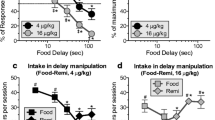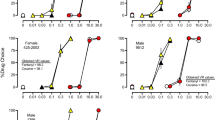Abstract
Rationale
Drug abuse can be conceptualized as choice between drug and nondrug reinforcers in which drug choice is excessive; factors impacting drug taking can be examined using procedures in which subjects choose between drug and an alternative reinforcer.
Objective
This experiment examined the effects of delayed reinforcement on choice between food and the mu-opioid receptor agonist remifentanil.
Methods
Rhesus monkeys responded under a concurrent fixed-ratio 5, fixed-ratio 5 schedule in which responding on one lever delivered one food pellet and responding on another lever delivered an i.v. infusion.
Results
With no delay, monkeys responded predominantly for food rather than saline or small doses of remifentanil; as the dose of remifentanil increased (0.1–1.0 μg/kg/infusion), monkeys responded more for drug. Delaying delivery (30–240 s) of 0.32 and not 1.0 μg/kg/infusion of remifentanil (food delivered immediately) decreased responding for drug and increased responding for food, resulting in a rightward shift in the remifentanil dose–effect curve. Delaying delivery of food (60–240 s) when doses of remifentanil smaller than 0.32 μg/kg/infusion (but not saline) were available decreased responding for food and increased responding for drug, resulting in a leftward shift in the remifentanil dose–effect curve.
Conclusion
These results provide evidence that delaying the delivery of a mu-opioid receptor agonist reduces its potency as a positive reinforcer; more importantly, delaying the delivery of an alternative nondrug reinforcer (e.g., food) enhances the reinforcing potency of the agonist. Thus, understanding the factors that control substance abuse requires examination of contingencies for both drug and nondrug reinforcers.




Similar content being viewed by others
References
Ainslie G (1975) Specious reward: a behavioral theory of impulsiveness and impulse control. Psychol Bull 82:463–496
Banks ML, Blough BE, Negus SS (2013) Interactions between behavioral and pharmacological treatment strategies to decrease cocaine choice in rhesus monkeys. Neuropsychopharmacology 38:395–404
Beardsley PM, Balster RL (1993) The effects of delay of reinforcement and dose on the self-administration of cocaine and procaine in rhesus monkeys. Drug Alcohol Depend 34:37–43
Bickel WK, Marsch LA (2001) Toward a behavioral economic understanding of drug dependence: delay discounting processes. Addiction 96:73–86
Campbell UC, Carroll ME (2000) Acquisition of drug self-administration: environmental and pharmacological interventions. Exp Clin Psychopharmacol 8:312–325
Chung S-H, Herrnstein RJ (1967) Choice and delay of reinforcement. J Exp Anal Behav 10:67–74
Compton WM, Volkow ND (2006) Major increases in opioid analgesic abuse in the United States: concerns and strategies. Drug Alcohol Depend 81:103–107
Czoty PW, McCabe C, Nader MA (2005) Assessment of the relative reinforcing strength of cocaine in socially housed monkeys using a choice procedure. J Pharmacol Exp Ther 312:96–102
de Wit H, Mitchell SH (2010) Drug effects on delay discounting. In: Madden GJ, Bickel WK (eds) Impulsivity: the behavioral and neurological science of discounting. American Psychological Association, Washington, pp 213–241
Heyman GM (2009) Addiction: a disorder of choice. Harvard University Press, Cambridge
Higgins ST (1997) The influence of alternative reinforcers on cocaine use and abuse: a brief review. Pharmacol Biochem Behav 57:419–427
Johnston LD, O’Malley PM, Bachman JG, Schulenberg JE (2012) Monitoring the future national results on adolescent drug use: overview of key findings, 2011. Institute for Social Research, The University of Michigan, Ann Arbor
Li J-X, Rice KC, France CP (2008) Discriminative stimulus effects of 1-(2,5-dimethoxy-4-methylphenyl)-2-aminopropane in rhesus monkeys. J Pharmacol Exp Ther 324:827–833
Logue AW (1988) Research on self-control: an integrating framework. Behav Brain Sci 11:665–709
Madden GJ, Petry NM, Badger GJ, Bickel WK (1997) Impulsive and self-control choices in opioid-dependent patients and non-drug-using control participants: drug and monetary rewards. Exp Clin Psychopharmacol 5:256–262
Mazur JE (1987) An adjusting procedure for studying delayed reinforcement. In: Commons ML, Mazur JE, Nevin JA, Rachlin H (eds) The effect of delay and of intervening event on reinforcement value, vol 5, Quantitative analyses of behavior. Lawrence Erlbaum Associates, Hillsdale, pp 55–73
Nader MA, Woolverton WL (1991) Effects of increasing the magnitude of an alternative reinforcer on drug choice in a discrete-trials choice procedure. Psychopharmacology 105:169–174
Nader MA, Woolverton WL (1992) Effects of increasing response requirement on choice between cocaine and food in rhesus monkeys. Psychopharmacology 108:295–300
Negus SS (2003) Rapid assessment of choice between cocaine and food in rhesus monkeys: effects of environmental manipulations and treatment with d-amphetamine and flupenthixol. Neuropsychopharmacology 28:919–931
Negus SS (2005) Interactions between the reinforcing effects of cocaine and heroin in a drug-vs-food choice procedure in rhesus monkeys: a dose-addition analysis. Psychopharmacology 180:115–124
Negus SS, Banks ML (2011) Making the right choice: lessons from drug discrimination for research on drug reinforcement and drug self-administration. In: Glennon RA, Young R (eds) Drug discrimination: applications to medicinal chemistry and drug studies. Wiley, Hoboken, pp 361–388
Paronis CA, Gasior M, Bergman J (2002) Effects of cocaine under concurrent fixed ratio schedules of food and IV drug availability: a novel choice procedure in monkeys. Psychopharmacology 163:283–291
Perry JL, Carroll ME (2008) The role of impulsive behavior in drug abuse. Psychopharmacology 200:1–26
Rachlin H (1974) Self-control. Behaviorism 2:94–107
Roll JM, Reilly MP, Johanson CE (2000) The influence of exchange delays on cigarette versus money choice: a laboratory analog of voucher-based reinforcement therapy. Exp Clin Psychopharmacol 8:366–370
Sizemore OJ, Lattal KA (1978) Unsignalled delay of reinforcement in variable-interval schedules. J Exp Anal Behav 30:169–175
Stoops WW, Lile JA, Glaser PAE, Hays LR, Rush CR (2012) Alternative reinforcer response cost impacts cocaine choice in humans. Prog Neuropsychopharmacol Biol Psychiatry 36:189–193
Vuchinich RE, Tucker JA, Rudd EJ (1987) Preference for alcohol consumption as a function of amount and delay of alternative reward. J Abnorm Psychol 96:259–263
Woolverton WL, Anderson KG (2006) Effects of delay to reinforcement on the choice between cocaine and food in rhesus monkeys. Psychopharmacology 186:99–106
Woolverton WL, Myerson J, Green L (2007) Delay discounting of cocaine by rhesus monkeys. Exp Clin Psychopharmacol 15:238–244
Acknowledgements
The authors would like to thank Armando Hernandez, Shannon Malesky, Ian McGraw, and Jeffrey Pressly for their excellent technical assistance. This work was supported by United States Public Health Service Grants R01DA029254, R01DA05018, T32DA031115 (DRM), and by a Senior Scientist Award K05DA17918 (CPF) from the National Institute on Drug Abuse, National Institutes of Health. The content is solely the responsibility of the authors and does not necessarily represent the official views of the National Institute on Drug Abuse or the National Institutes of Health.
Conflict of interest
The authors have no conflict of interest.
Author information
Authors and Affiliations
Corresponding author
Rights and permissions
About this article
Cite this article
Maguire, D.R., Gerak, L.R. & France, C.P. Delay discounting of food and remifentanil in rhesus monkeys. Psychopharmacology 229, 323–330 (2013). https://doi.org/10.1007/s00213-013-3121-x
Received:
Accepted:
Published:
Issue Date:
DOI: https://doi.org/10.1007/s00213-013-3121-x




